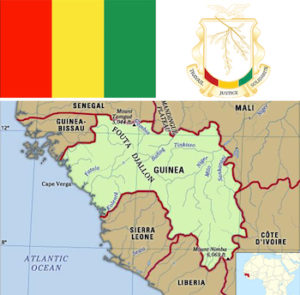
*On this date in 1958, Guinea gained its independence from France.
Self-governing occurred 74 years after the 1884 invasion from the Berlin Conference, the high point of white-European competition for territory in Africa, a process commonly known as the Scramble for Africa. That year, the French Fourth Republic collapsed due to political instability and its failures in dealing with its colonies, especially Indochina and Algeria.
The French people supported the founding of the Fifth Republic. In contrast, French President Charles de Gaulle made it clear in August 1958 that France's colonies were to be given a stark choice in the referendum to be held on September 28, 1958, between more autonomy in a new French community and immediate independence.
The other colonies chose the former, but Guinea, under the leadership of Ahmed Sékou Touré, whose Democratic Party of Guinea-African Democratic Rally (PDG) had won 56 of 60 seats in 1957 territorial elections – voted overwhelmingly for independence. The French withdrew quickly, and Guinea proclaimed itself a sovereign and independent republic, with Sékou Touré as president.